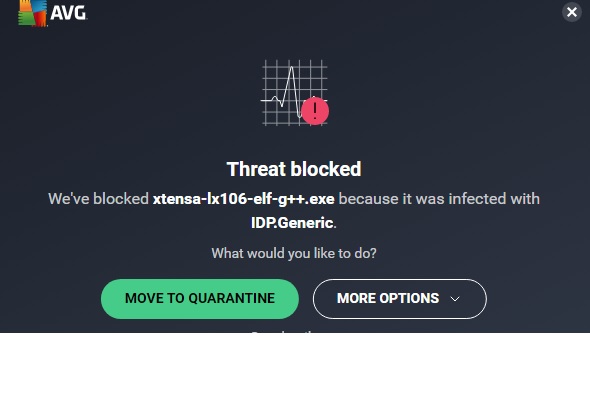Upgraded and now unable to use it
Has virus in it. xtena-lx106-elf-g++.exe virus IDP.Generic

Hi @cx32. Thanks for your report. This file is the compiler used by 3rd party boards platforms such as "ESP8266 Boards":
It is not used by any of the official Arduino boards and is not part of the Arduino IDE installation (though you can install those 3rd party boards platforms using the IDE's Boards Manager).
So I think that this warning is not directly related to the Arduino IDE.
What were you doing when you got that message about the file?
Win7 was writing code and did a verify/compile to check it.
Been using Arduino for years and ESP32 & 8266 for a few months.
Upgraded IDE 2 to the latest version TODAY and not been able to compile/verify or upload since. Regular IDE does not work for the same error.
3.0.4-gcc10.3-1757bed/bin/xtensa-lx106-elf-g++": file does not exist. That's in the .exe that was quarantined?
Had no problem yesterday or months before.
So is this a ESP issue but why did it show up now?
@cx32 please upload the file to VirusTotal and then share a link here to the results page:
Thanks. The file from my installation of the "ESP8266 Boards" platform also has the same hash, so we know your file was not tampered with.
False positives from antivirus software are unfortunately quite common, but of course we also must always be vigilant about security. This means it is difficult to know when to take such a detection seriously. I think the best thing you could do is submit a report to the ESP8266 Boards platform developers:
It is possible they will be able to do an investigation and perhaps to request AVG to correct the false detection if their investigation finds it to be so.
Other research with virus type have 2 conclusions:
1, False positive
2, ESP products are Chinese made and they put in a little code in hope of MORE data collection on us.
So I am confused and wondering if I should continue with ESP products.
Submitted a message of espressif form about this.
Of course if they put in data mining code, they will admit it right? ![]()
Thanks @cx32. I am monitoring that forum topic to make sure I will be aware of any developments.
In theory you should be able to compile this tool from the free open source GCC compiler source code if you would like to remove some links from the "chain of trust" of this file.
I believe that there are some proprietary components in the ESP-SDK, but that is completely separate from the "xtensa-lx106-elf-gcc" tool that is triggering the detection.
Beyond the "ESP8266 Boards" platform repository at the URL I shared above, I believe the next step would be here (this is the project used by that boards platform to build the file:
OK have downloaded the ZIP, expanded it and looking at the readme.
OK will compile my own version of that file.
1st thing is Run: make download.
Have Win 7 (64) and no executable called "make", further down using the git command. Have no executable named "git".
Not found any file named "download"
Have raspberry Pi 4B and been using git there, but need this on the Win7 PC.
So not familiar with this and it has presumption I don't know to make it work.
And/or other software is needed that is not stated.
This is an advanced procedure that will inevitably require quite some perseverance and dedication. This even more so on Windows, where the tools are not so readily available and the differences from Linux/Unix likely to cause annoying problems.
Although I would love to join you in this interesting journey of learning, unfortunately, I don't have any spare time right now. Hopefully some other helpers here will be able to provide you with a bit of guidance.
Here is Git for Windows:
https://git-scm.com/download/win
As you probably already know from using it on your Raspberry Pi, this is a very useful tool on its own, even if you don't end up using to build the ESP8266 toolchain. So I do recommend installing it either way.
The Git for Windows installation also comes with something called "Git Bash". This is an excellent Bash shell for Windows. This can be very useful when you are using projects or tutorials that assume the availability of a standard POSIX shell, and thus would not be usable with the horrible Windows native PowerShell or cmd shells. Despite the "Git" in the "Git Bash" name, this is a general purpose shell that can be used even for applications that have nothing to do with Git.
Been unable to compile that .exe. There is assumed information I don't have.
Looked into other ways to program ESP boards. MicroPython so far is working good and it looking like will NOT need/use Arduino IDE for programming these devices.
So thank you for your help.
I understand. Unfortunately this is too often the experience with open source software, where the code is free to all but approachable only to a few (though I should make it clear that Earle Philhower's project is specifically about making it far more approachable than it would be otherwise).
Before the Arduino project came along, you would likely need to go through such a process and more before you could even blink your first LED, which excluded many from exploring the wonderful possibilities of embedded systems.
Best wishes for success with your MicroPython endeavors.
This topic was automatically closed 180 days after the last reply. New replies are no longer allowed.